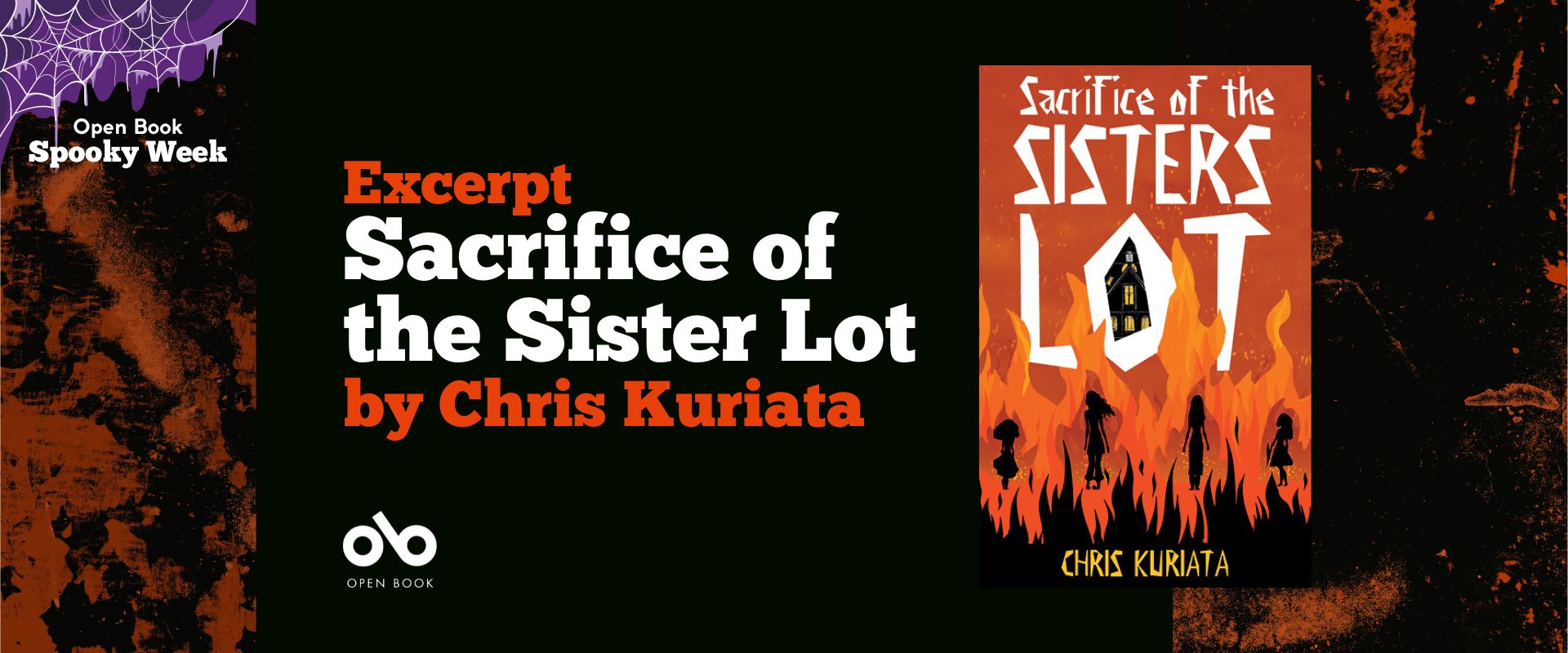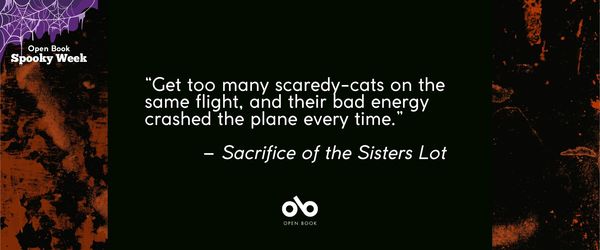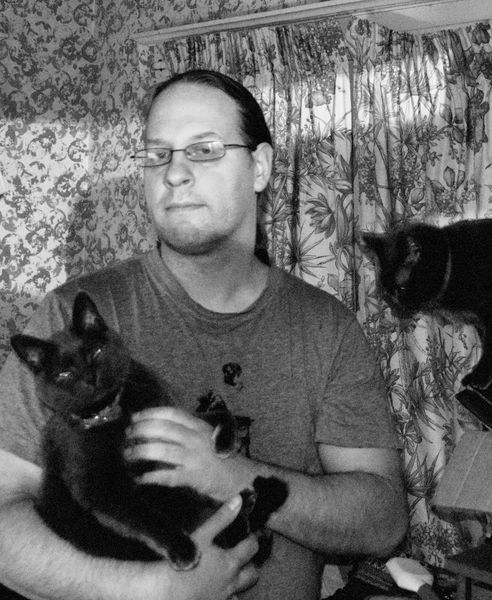Excerpt: Get Spooky with Chris Kuriata's Dark Wishing-Grant Tale, Sacrifice of the Sisters Lot
Every kid who ever made a wish while blowing out their birthday candles would assume that having your every wish granted would be, well, spectacular. But in Chris Kuriata's deliciously creepy new novel, Sacrifice of the Sisters Lot (Palimpsest Press), 12-year old Emery and her sisters find out that nothing is quite that simple.
Set against a vivid late 80s backdrop in the Niagara region—populated by backyard sprinklers, TV faith healers, and the roiling unease of suburbia—Kuriata's tale is tense and absorbing. When Emery and her sisters discover a powerful entity within the walls of their house they find that, for reasons of its own, it is willing to grant their youthful desires.
Their first innocent requests for a pet cat and fancy lipsticks progress to new boyfriends and later, long-overdue revenge against a local abuser. But no wish comes without consequences, and the girls begin to realize the danger they are in just as their conman uncle and bullying grandmother move in to take over for their vanished parents. As a greater threat emerges to put the whole town in danger, the sisters' devotion to one another is put to the test.
The sisters' bond and the disorienting process of coming of age as a girl centres the book's metaphysical aspects, creating an urgent, complex, and moving story that never sacrifices on suspense.
Today we're kicking off Open Book's 2023 Spooky Week (stick around for some of the season's best spine tinglers) with an excerpt from Sacrifice of the Sisters Lot, a perfect spooky season read. Here we see the sisters' aunt determinedly hitchhiking to them as the town faces a horrifying disaster.
Excerpt from The Sacrifice of the Sisters Lot by Chris Kuriata:
My sisters and I wrote to Auntie Linda, begging her to come to our rescue.
She did the best she could.
Auntie Linda ignored our pleas to fly, figuring with delays and layovers she would be just as fast coming by car as she would by air. She never flew because she hated the view from the plane window, barely moving, just nudging through the clouds. Planes were full of nervous people, and they made dangerous company. Get too many scaredy-cats on the same flight, and their bad energy crashed the plane every time. She’d rather take her thumb to the highway any old day. Cars always stopped to give Auntie Linda a lift. She’d sit on the edge of the passenger seat, surrounded by the scent of air freshener, loving the blur of rocks and trees shooting past as she smacked the dashboard, commanding her driver to go Faster! Faster!
Now that she was coming to our rescue, her once friendly highways grew treacherous. Auntie Linda hadn’t co-piloted a vehicle into an accident yet, but sudden rains and sloping roads repeatedly swept the car into the wrong lane. Blinded by the light of an approaching tractor-trailer, her driver froze with panic, and only Auntie Linda saved them from a head-on collision, reaching across the dashboard to take the wheel herself. During traffic jams she made up for lost time by hopping guard rails and sprinting between the cars, taking every foot closer to us she could steal.
In defiance of the force trying to stop her, Auntie Linda kept moving.
Your CanLit News
Subscribe to Open Book’s newsletter to get local book events, literary content, writing tips, and more in your inbox
The average hitchhike from Thunder Bay to our home could be accomplished in seventeen pickups. This time she did fifty-eight, often in the car for just the length of a tunnel. A true people person, she could recall the name and at least one detail about everyone who picked her up; from Colin, the depressed woodwind salesman, to Paula, who’d been run out of town after she’d inadvertently forgotten to put the G-46 ball into the Bingo tumbler, thus running a crooked game, to Jay, the dour young man who claimed to have stolen his car during a bank robbery outside of Sarnia, but when Auntie Linda looked in the glove box she found the registration in Jay’s name and a photograph of him in a classroom surrounded by children. She remembered every face, good joke, and close call during her twenty-hour journey, which felt like two months of travel balled into one frantic hop from car to car.
And she beat the first available flight from the Thunder Bay Airport, which had been forced to shut down after a glitch in their instrumentation nearly sent a landing plane off the end of the runway.
She arrived on our street at noon, cupping a palm over her eyebrows to protect against the glare of the sun and the grit in the smoky air. Wooden sawhorses and yellow police lines prevented her from getting any closer. Auntie Linda waved her arms to summon the officers guarding the barricades, offering the letter my sisters and I had written as proof she’d been invited and should be allowed to pass. The police wouldn’t even read our letter. All they wanted from Auntie Linda was a phone number in case she was needed to make identifications. She tried sweet-talking the officers, suggesting she brew up big pots of coffee. “Maybe I could make you all sandwiches, depending on what groceries my sister has in the house.” The police refused her generous offer, hiding behind their sunglasses.
Without birds or dogs or traffic, our entire neighbourhood remained quiet as a closet, all the way from the General Hospital to the canal locks past Victoria Lawn Cemetery. The only sound came from the sky, the chopping blades of a hovering news helicopter that took the famous photos of the hundreds of dead bodies laid out on all the front lawns—each mummified family in their own neat column, like the boneyard in a game of dominoes. There weren’t enough sheets to cover all the bodies. Many of them lay exposed; no privacy. Thankfully, their eyes were closed. The shame of looking at them would have been unbearable otherwise.
Days passed before the police found me and my sisters, the only ones left standing. Our rescuers scowled at us, unable to disguise their anger over what we had done. One at a time, my sisters and I were marched out of the house, our battered and burnt bodies paraded before the news cameras, where we were assigned the blame for each terrible thing that had happened.
*
Decades later, Niagara remains bitter over the Great Catastrophe.
The ghosts of missing parents and children will forever pollute the atmosphere—all that lost potential for happiness clogs up the sky like smog, so even on a clear day, you can barely see further than the end of the street. My sisters and I hide indoors, but when we venture out for supplies (always early morning, under the cover of dark for maximum anonymity), we sense the uncharitable thoughts from the store clerks and hobos who cross our path.
Unbelievable. Thousands dead because those brats wanted a goddam cat.
Let it be known the cat was my idea. That’s on me.
_______________________________________________
Excerpt taken from The Sacrifice of the Sisters Lot, a novel by Chris Kuriata, published by Palimpsest Press. Copyright Chris Kuriata, 2023. Reprinted with permission.
Chris Kuriata lives in and often writes about the Niagara Region. His short fiction about elderly poisoners, home-invading bears, and translating the dead has appeared in magazines in Canada, the US, the UK, Ireland, New Zealand, South Africa, and Japan. His writing has also been performed on podcasts such as Pseudopod and The NoSleep Podcast. Before turning his attention to fiction, he wrote and edited documentary series about true crime, tent revivals, and hockey.






